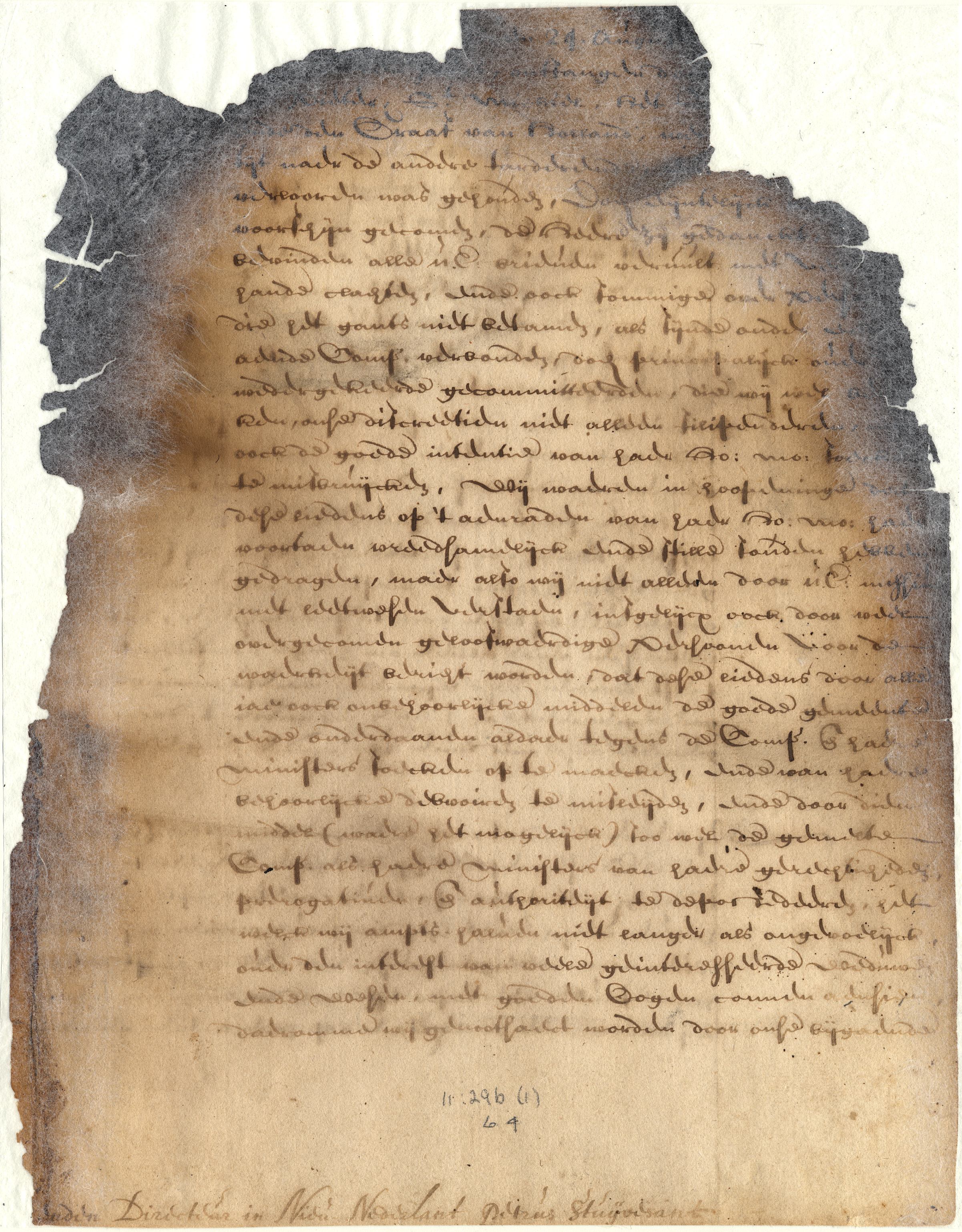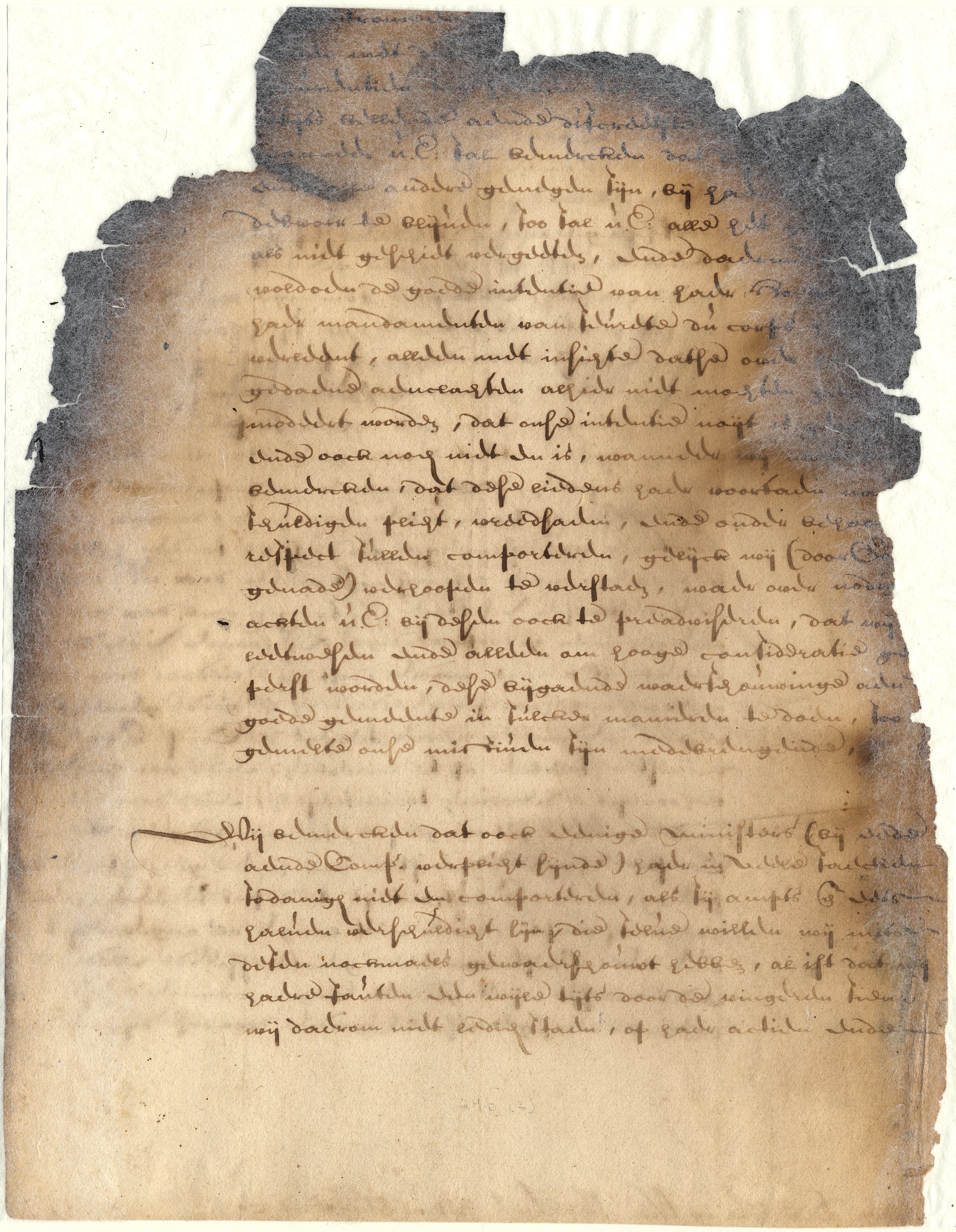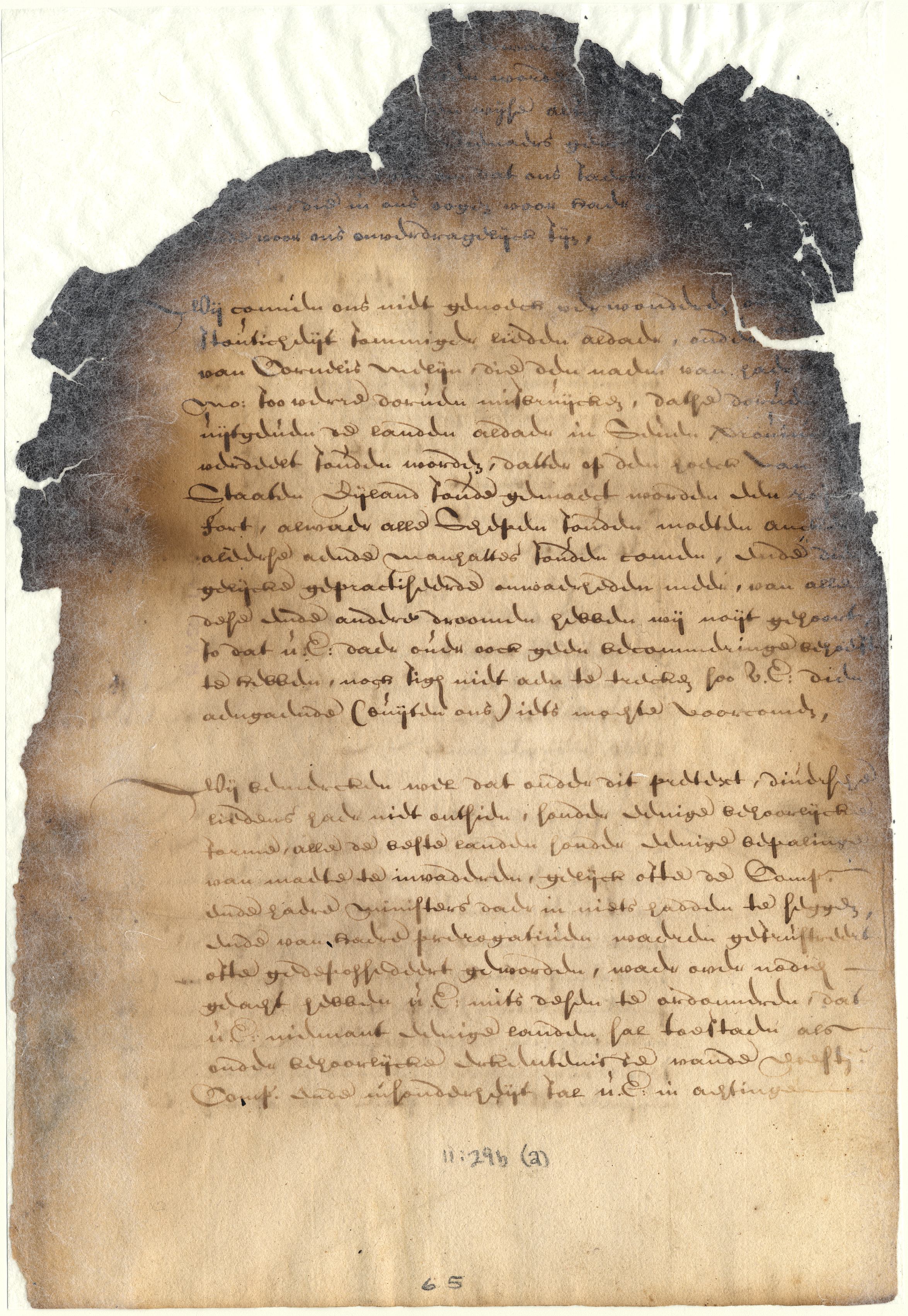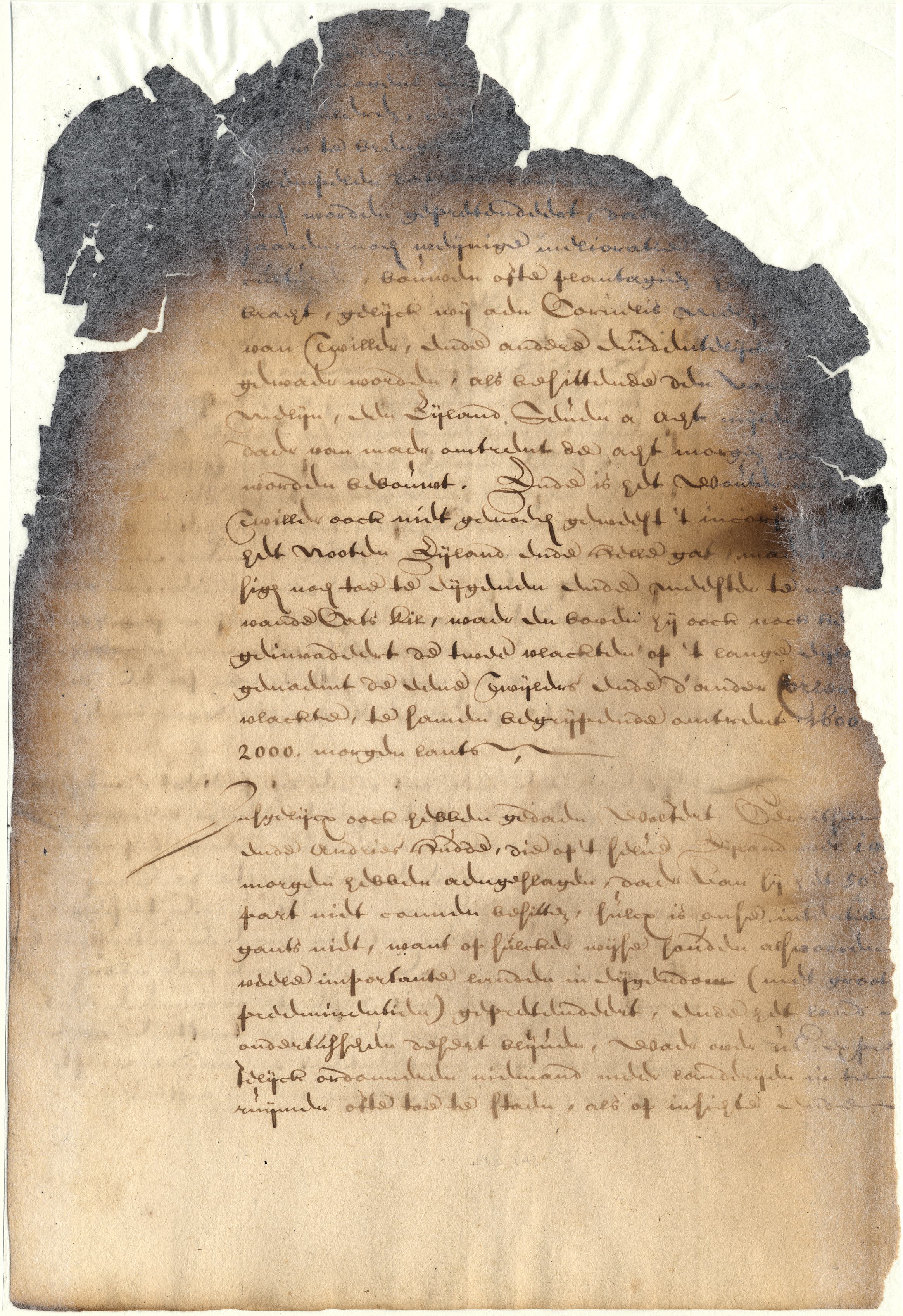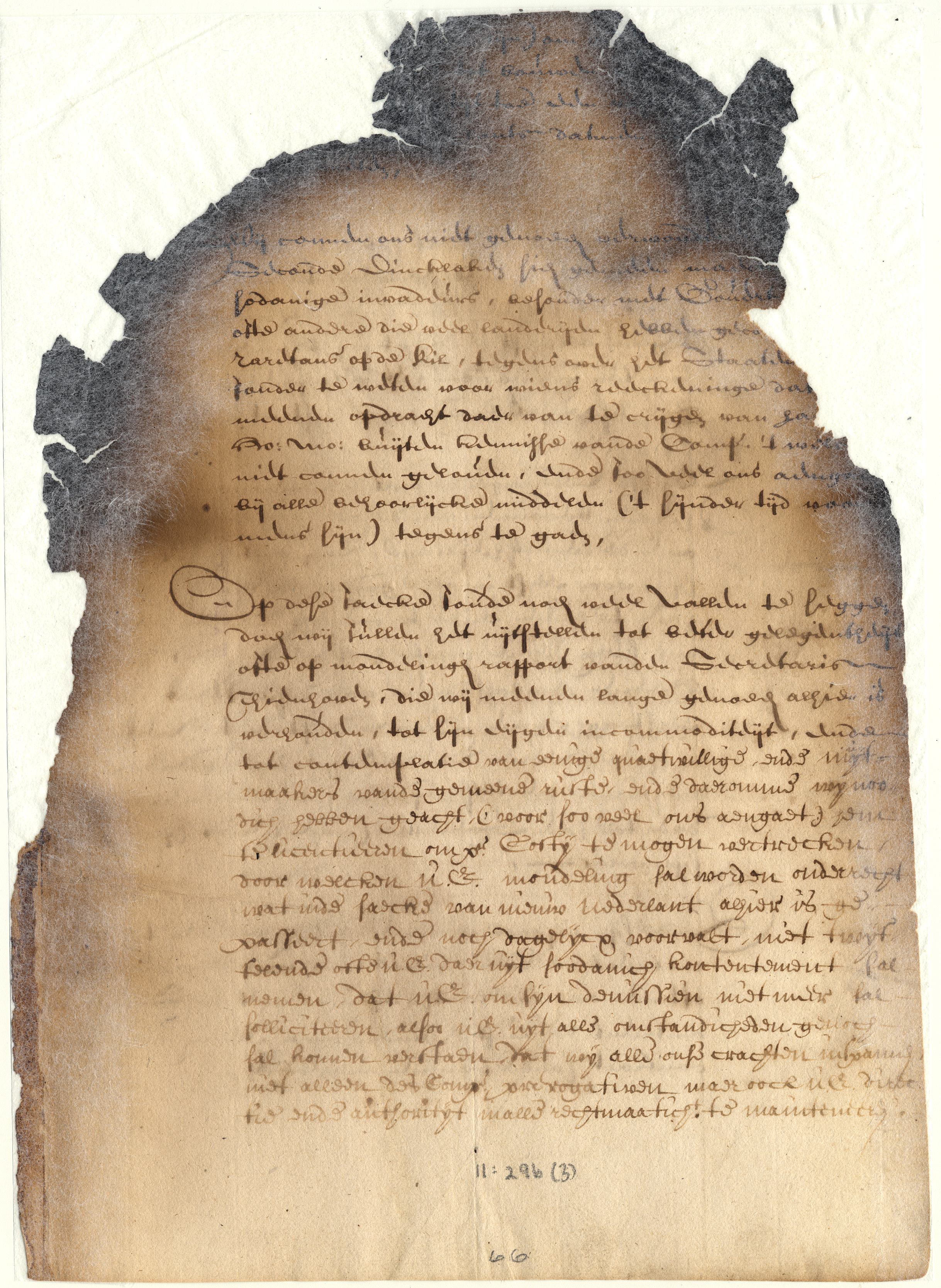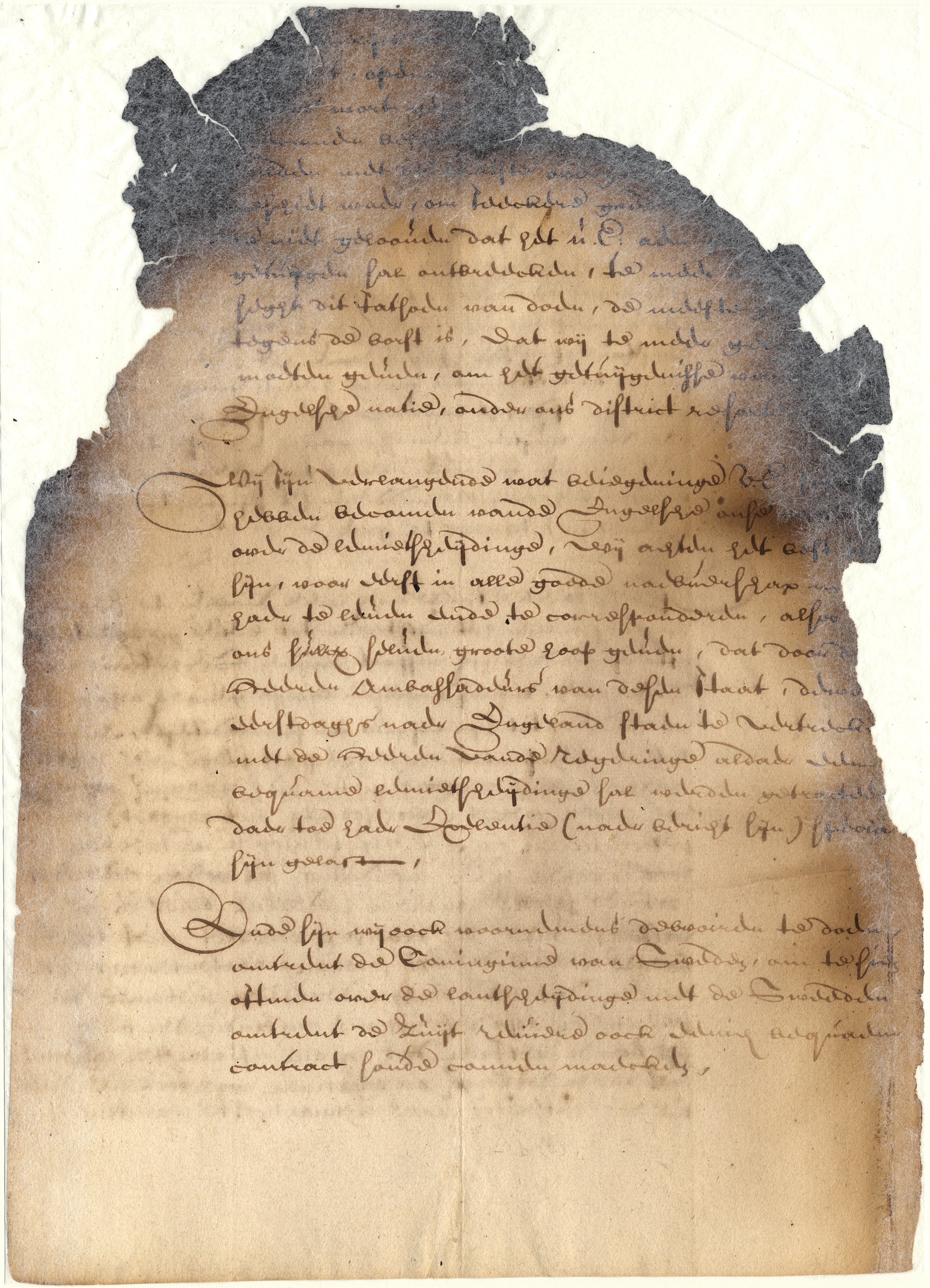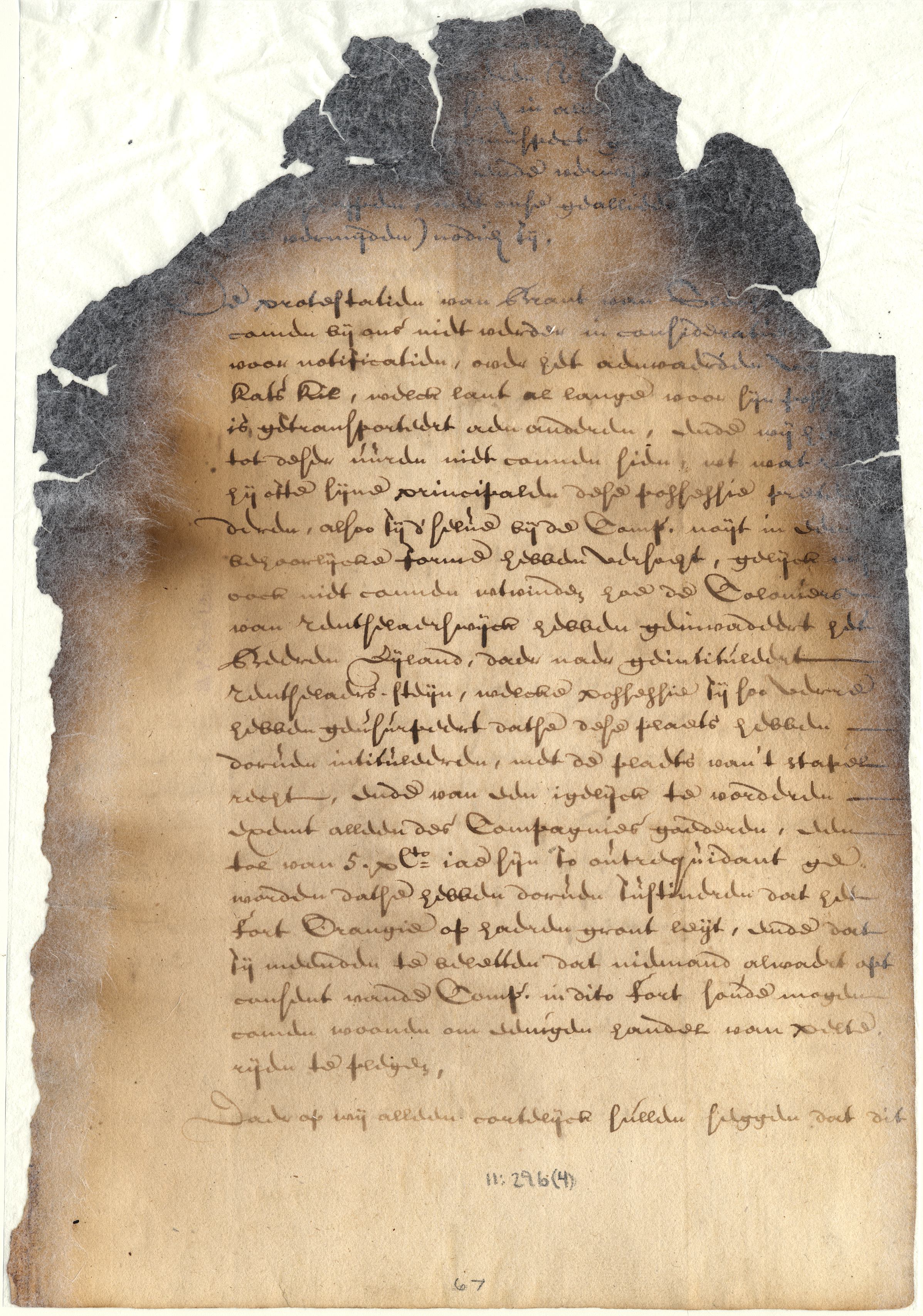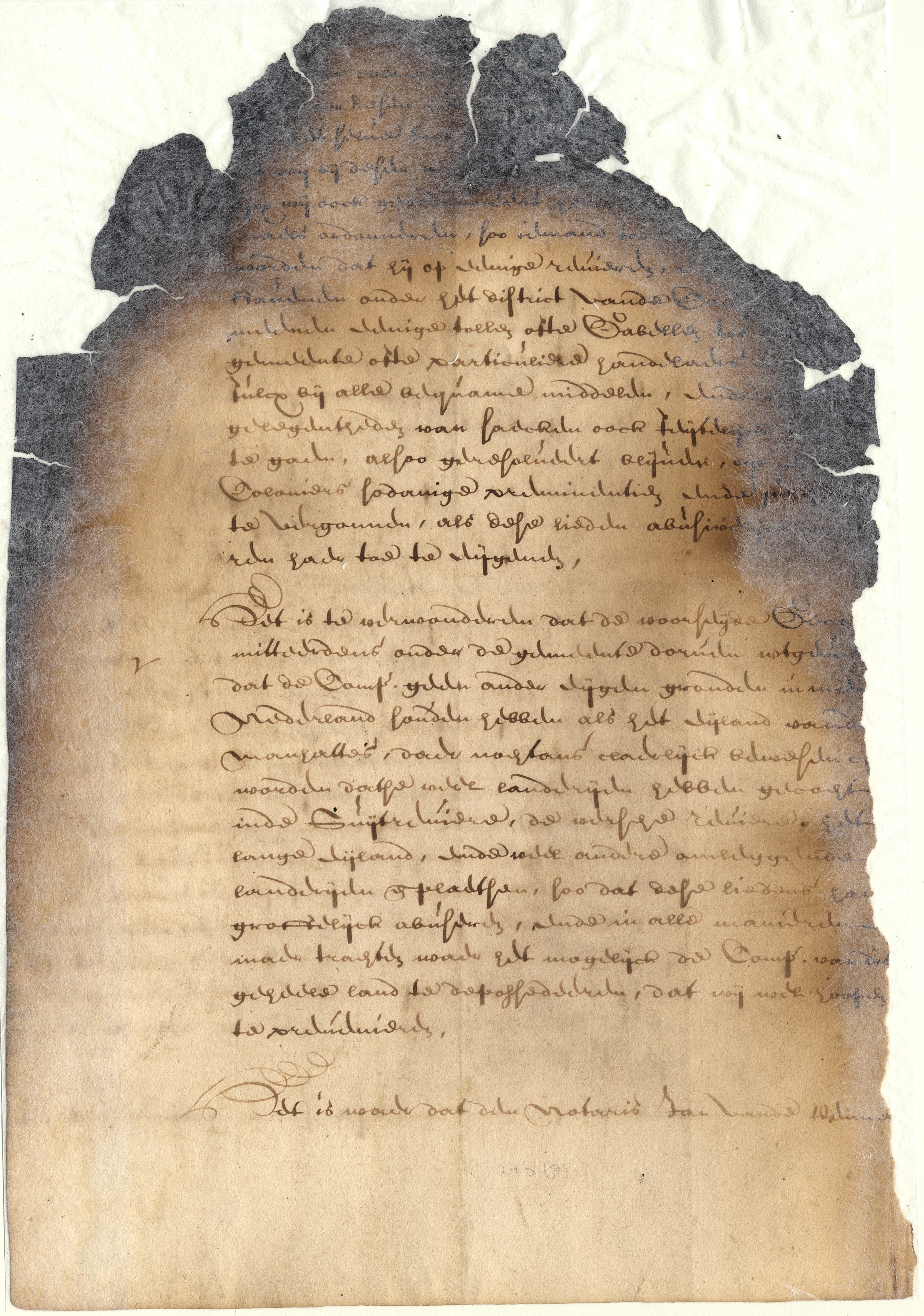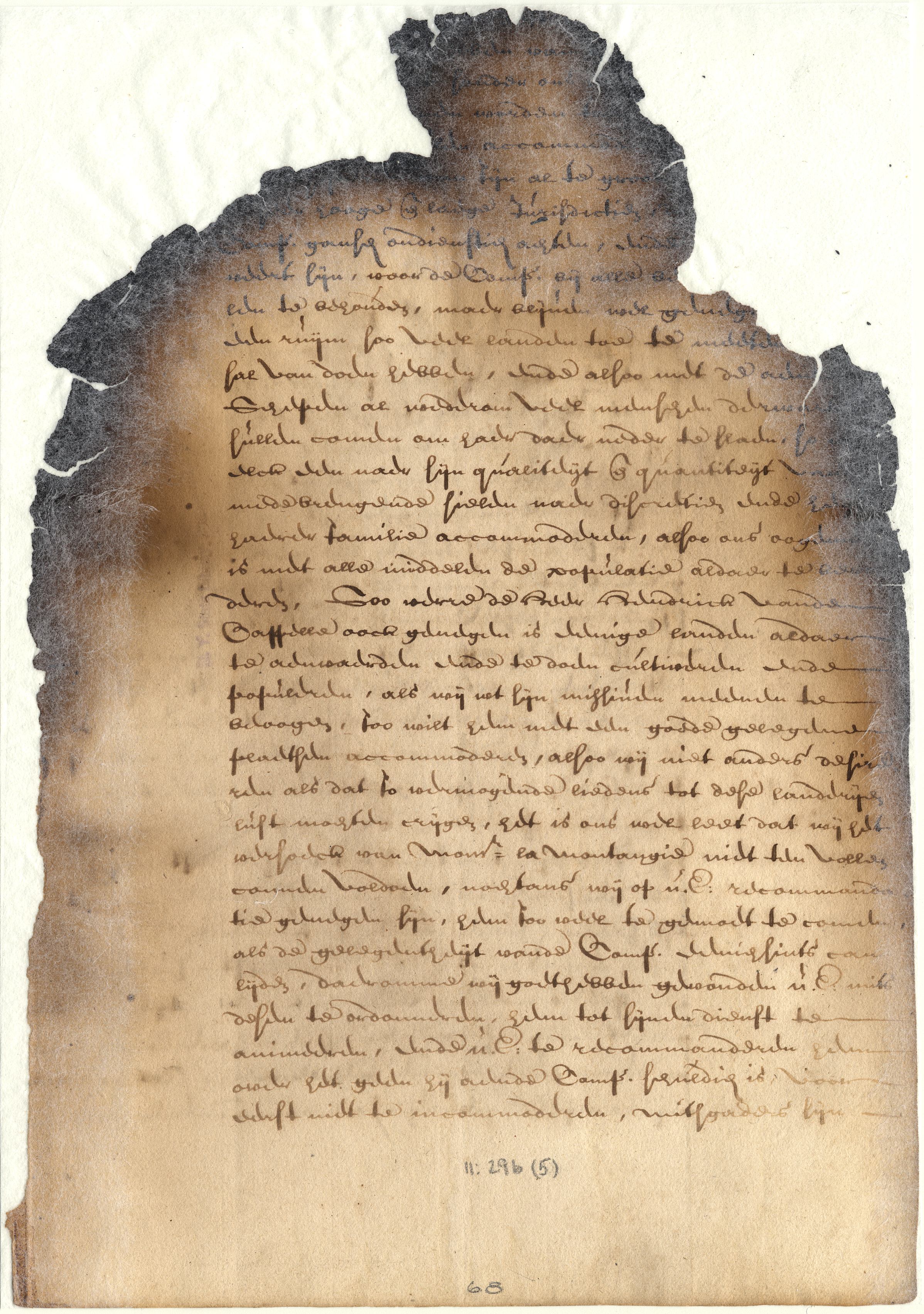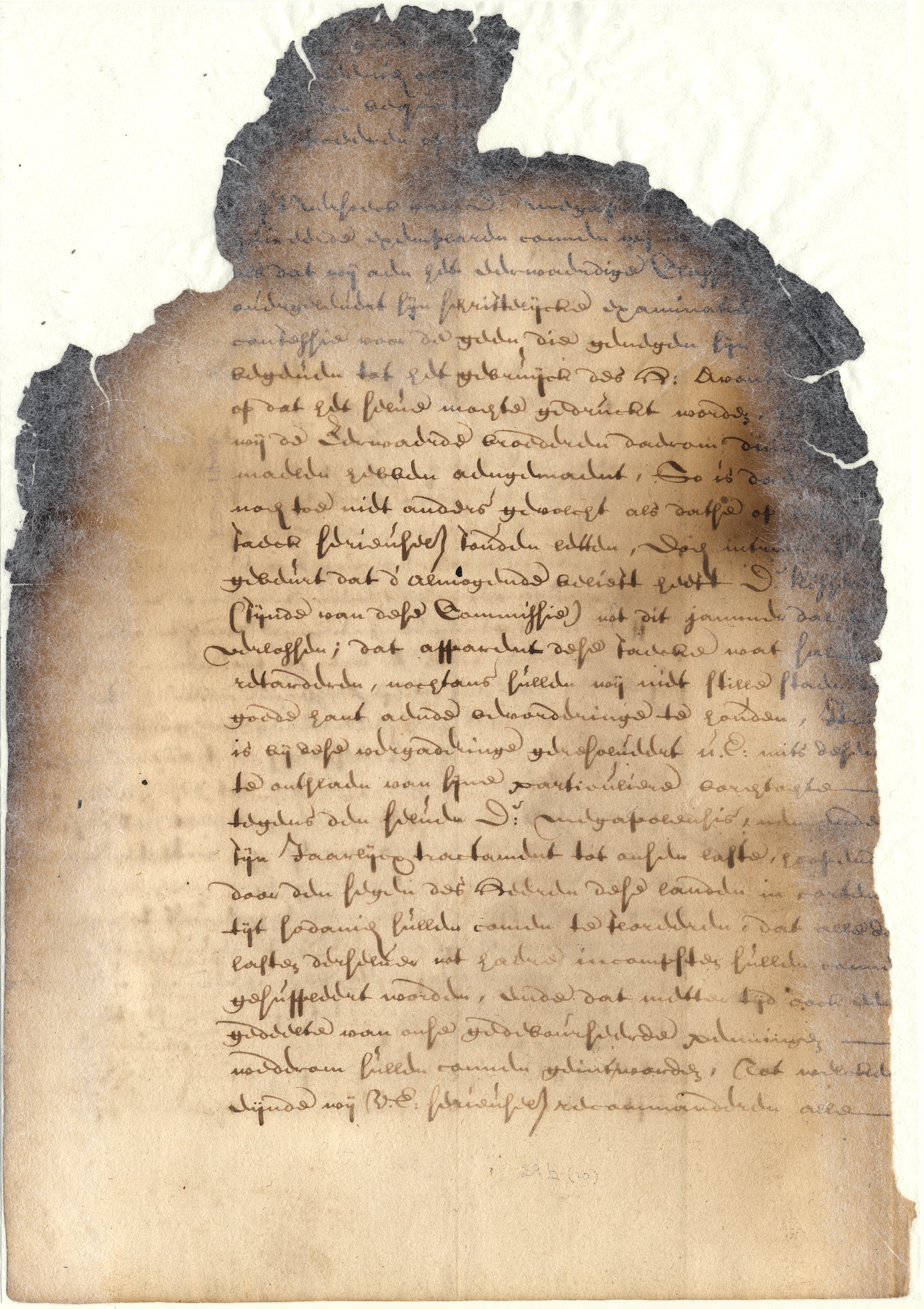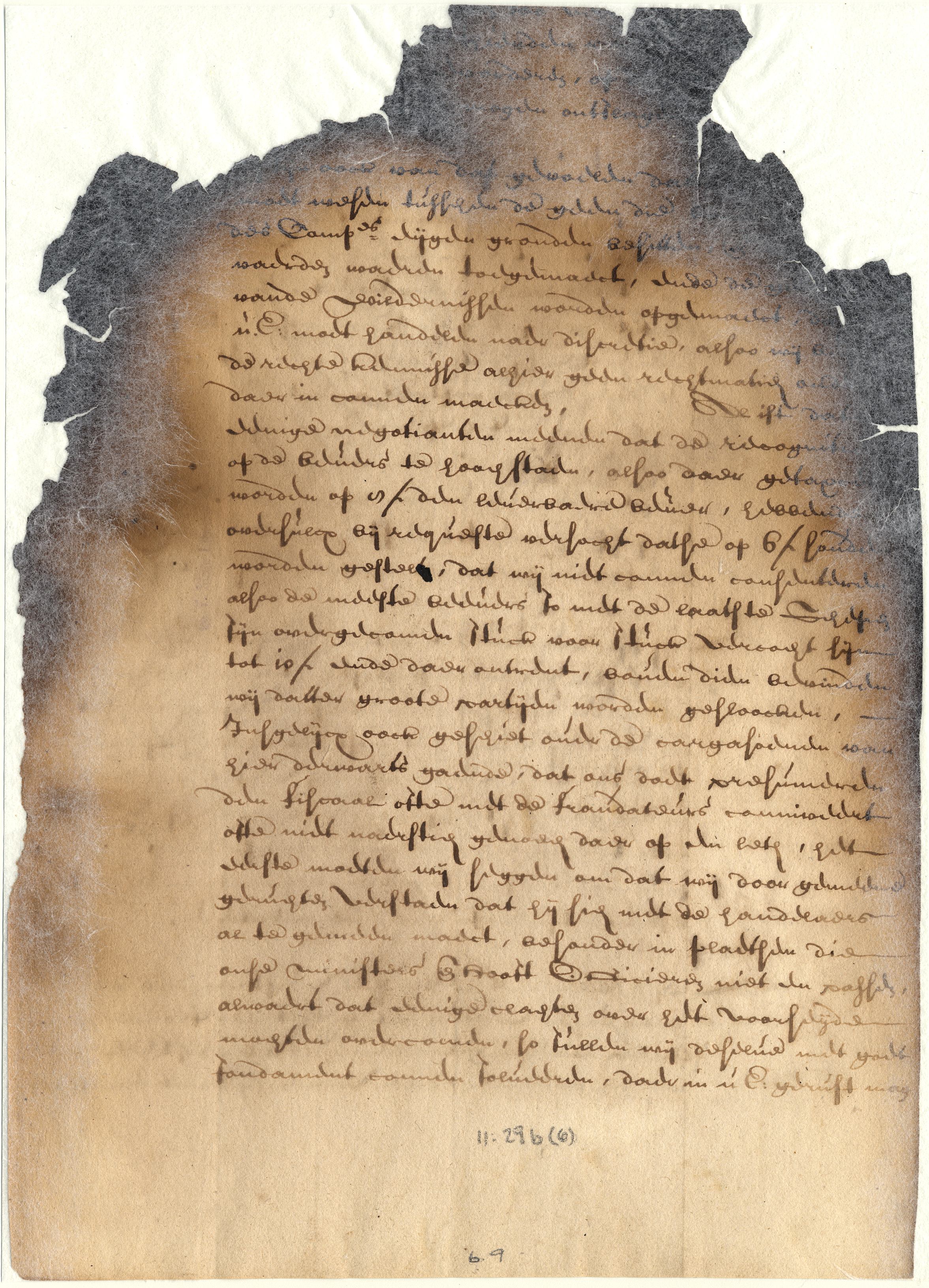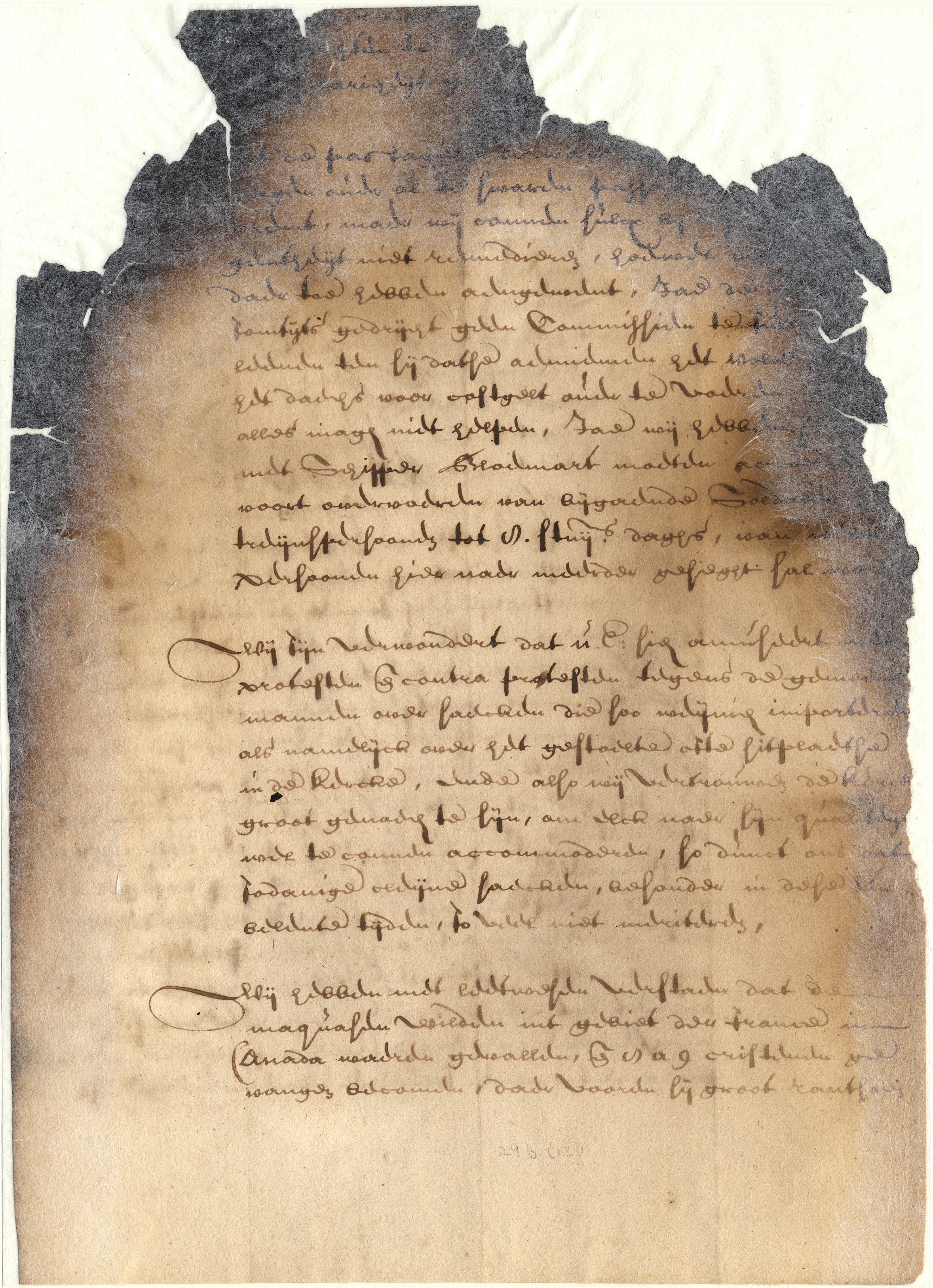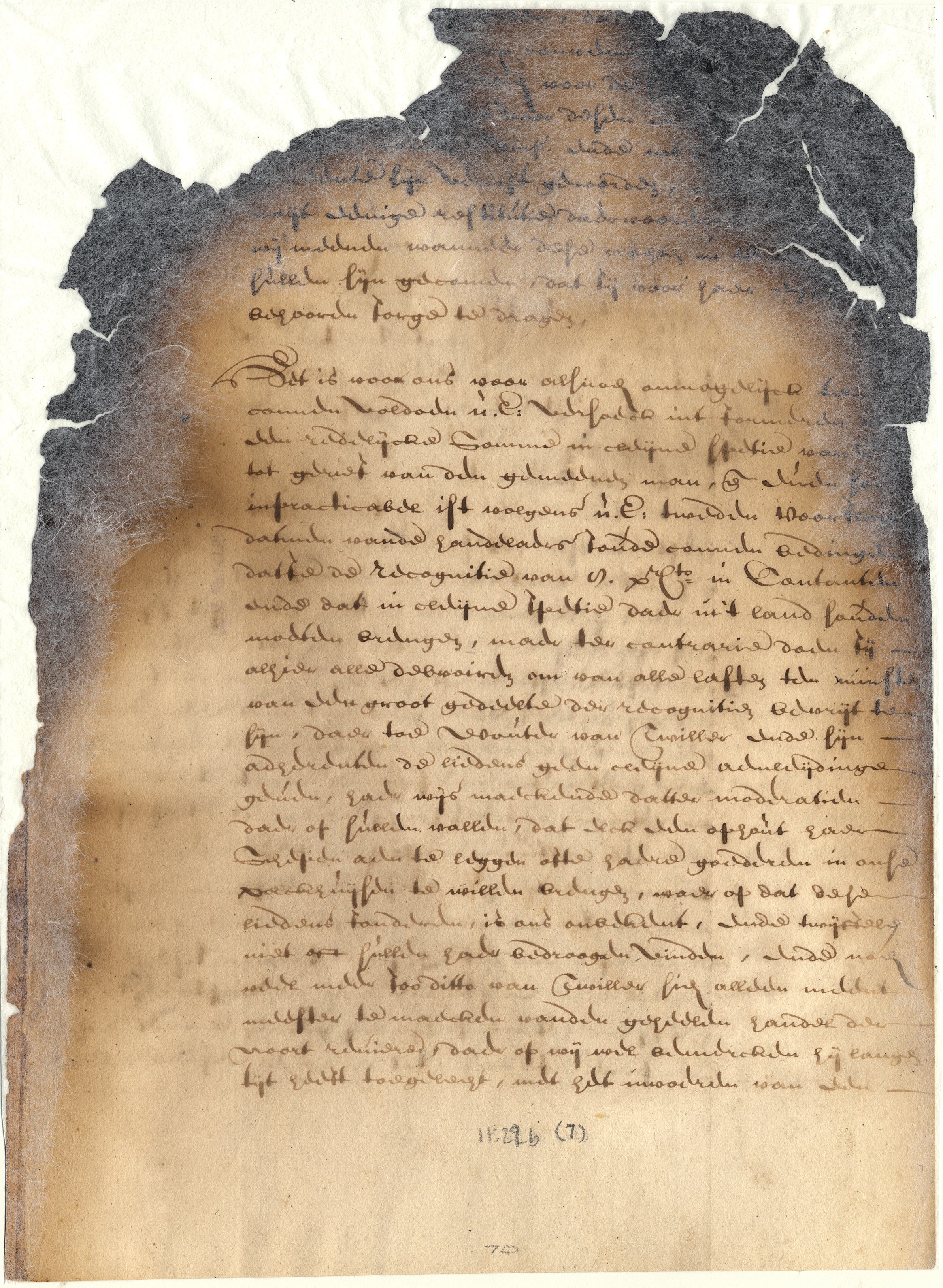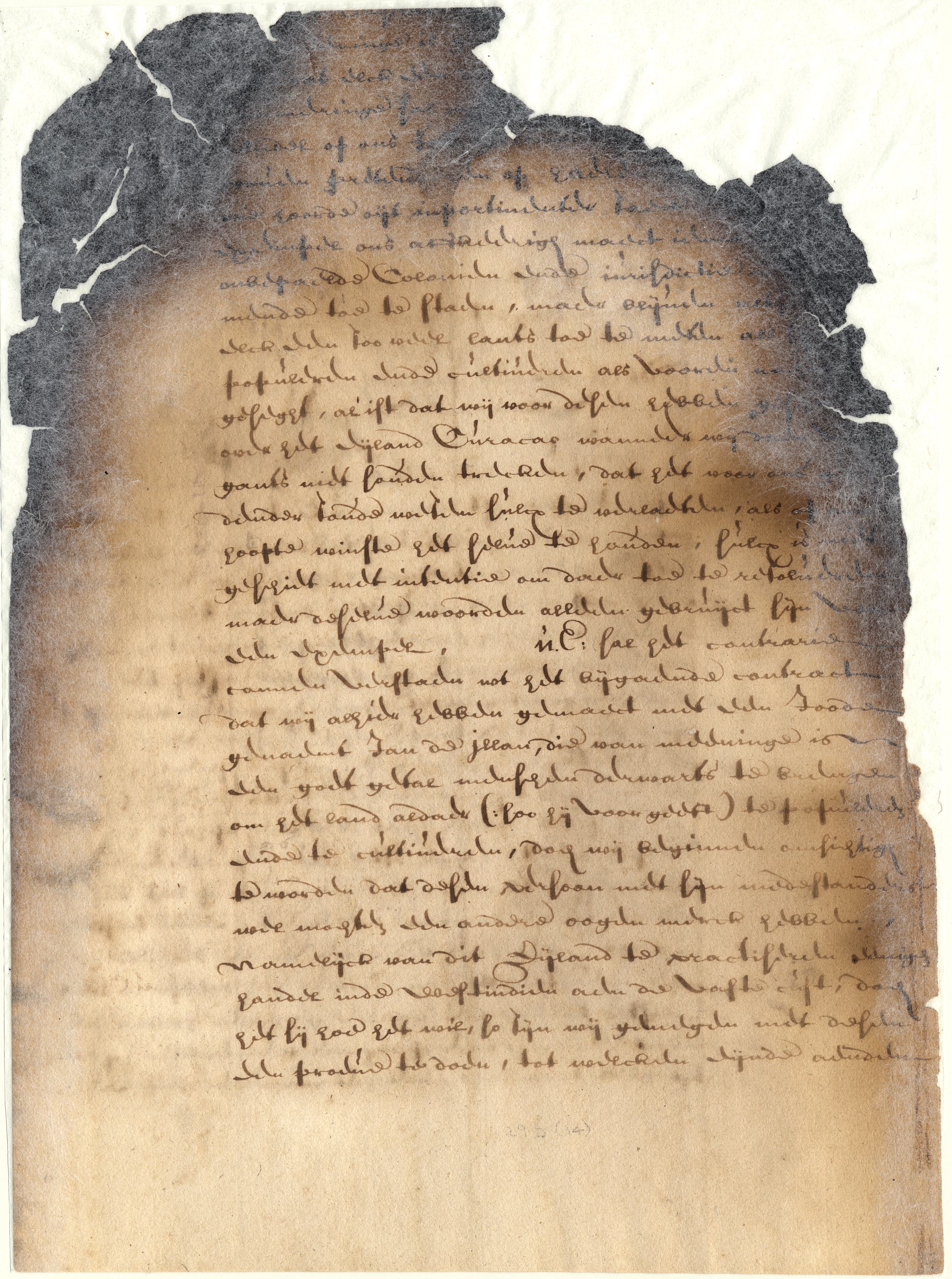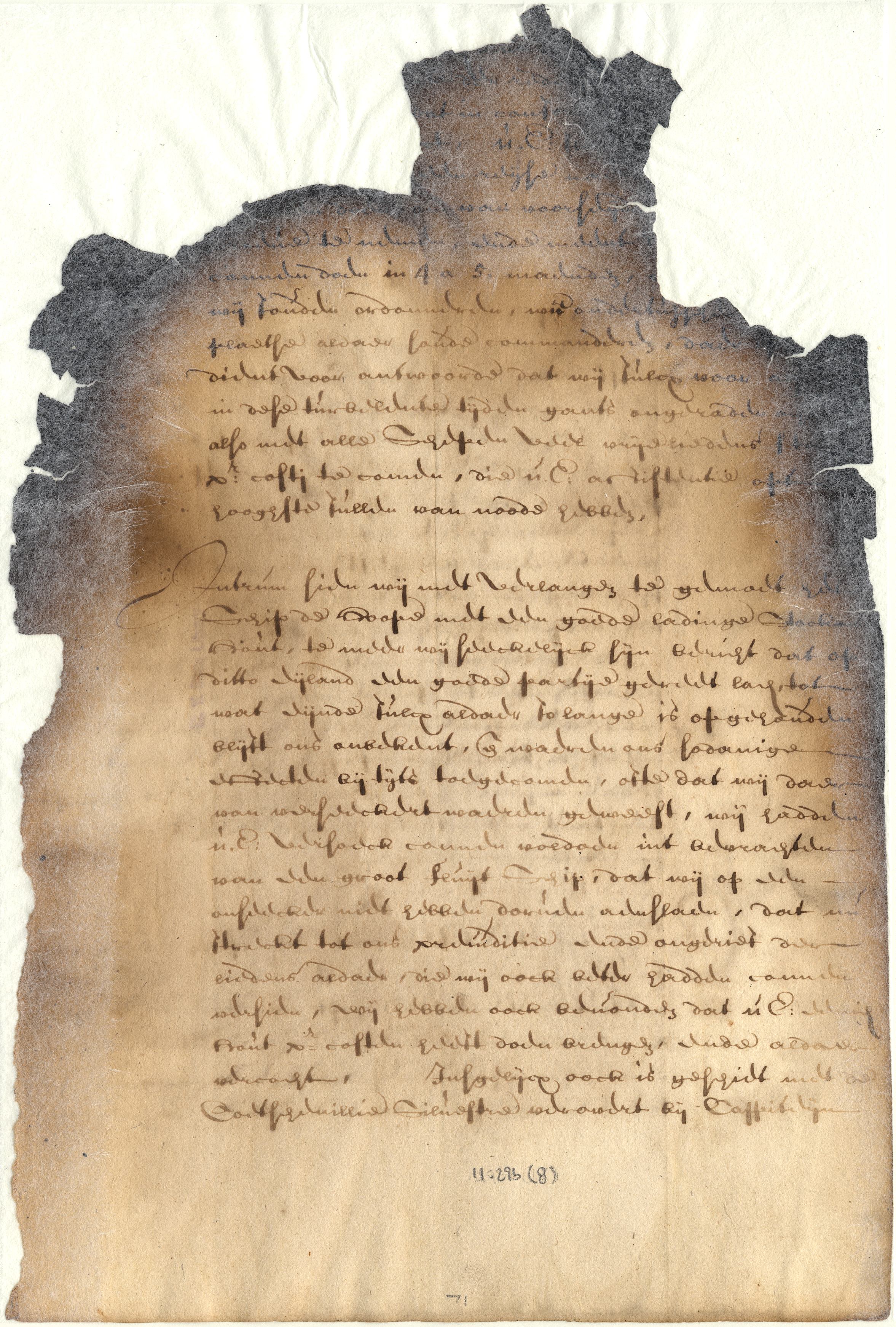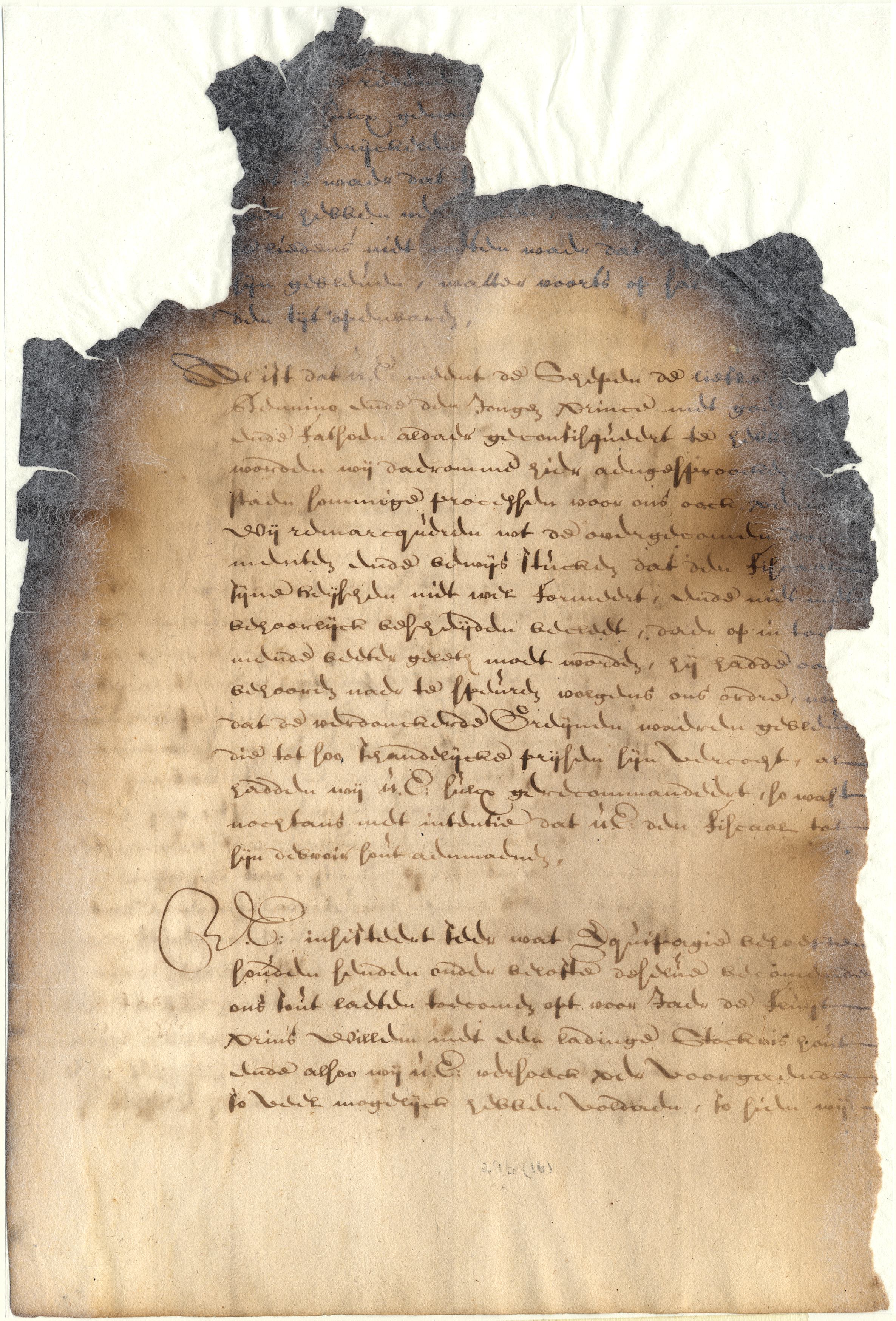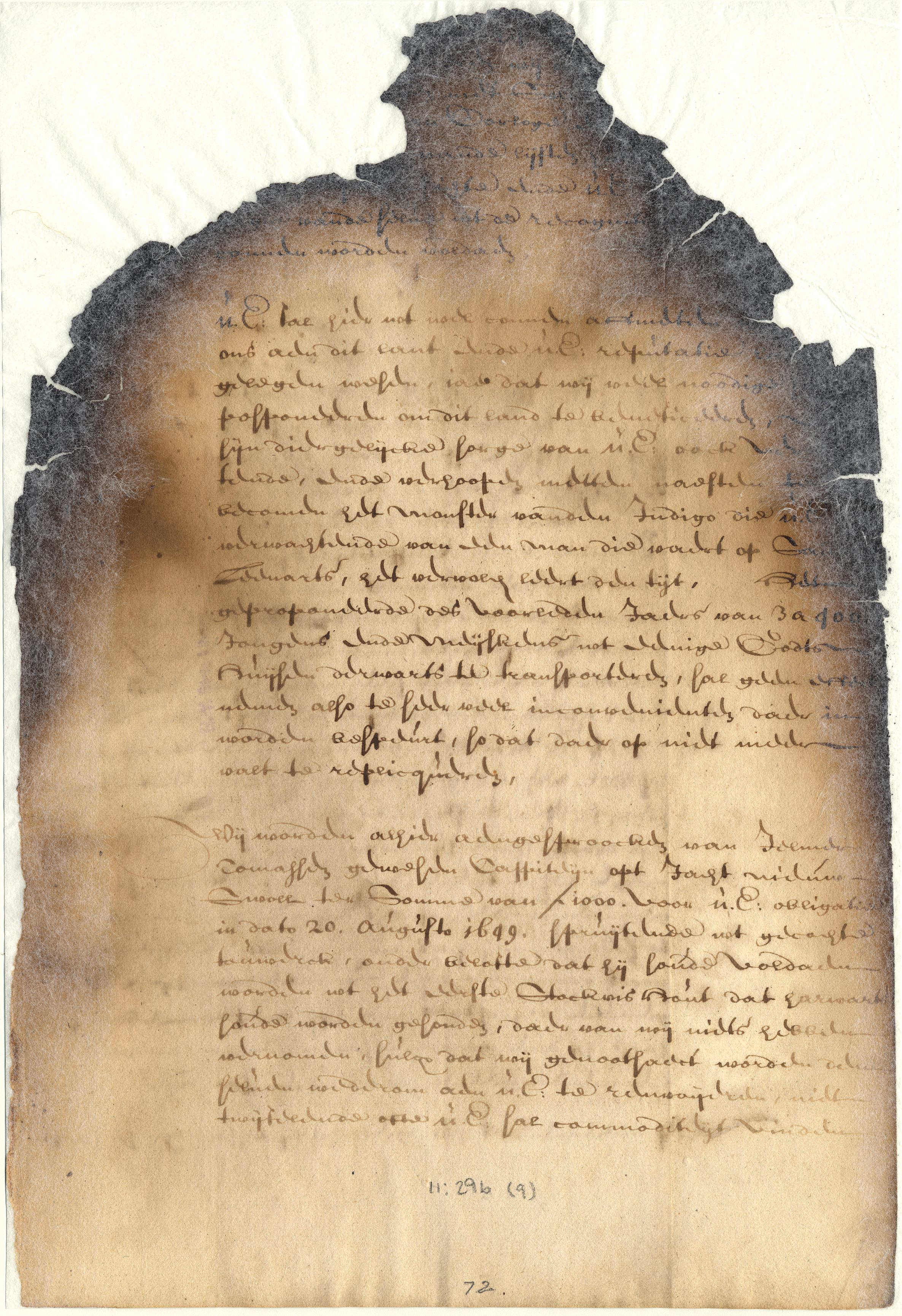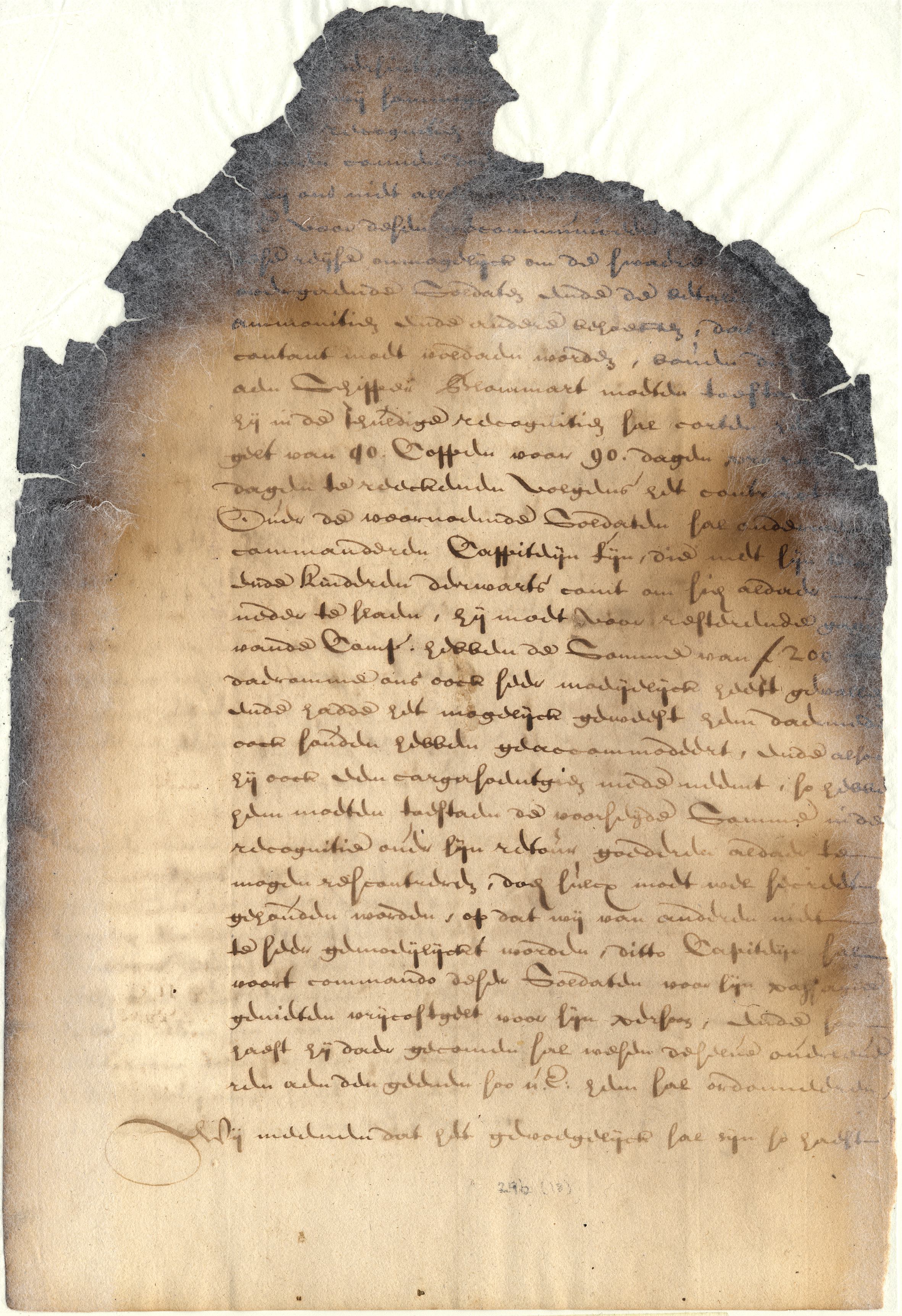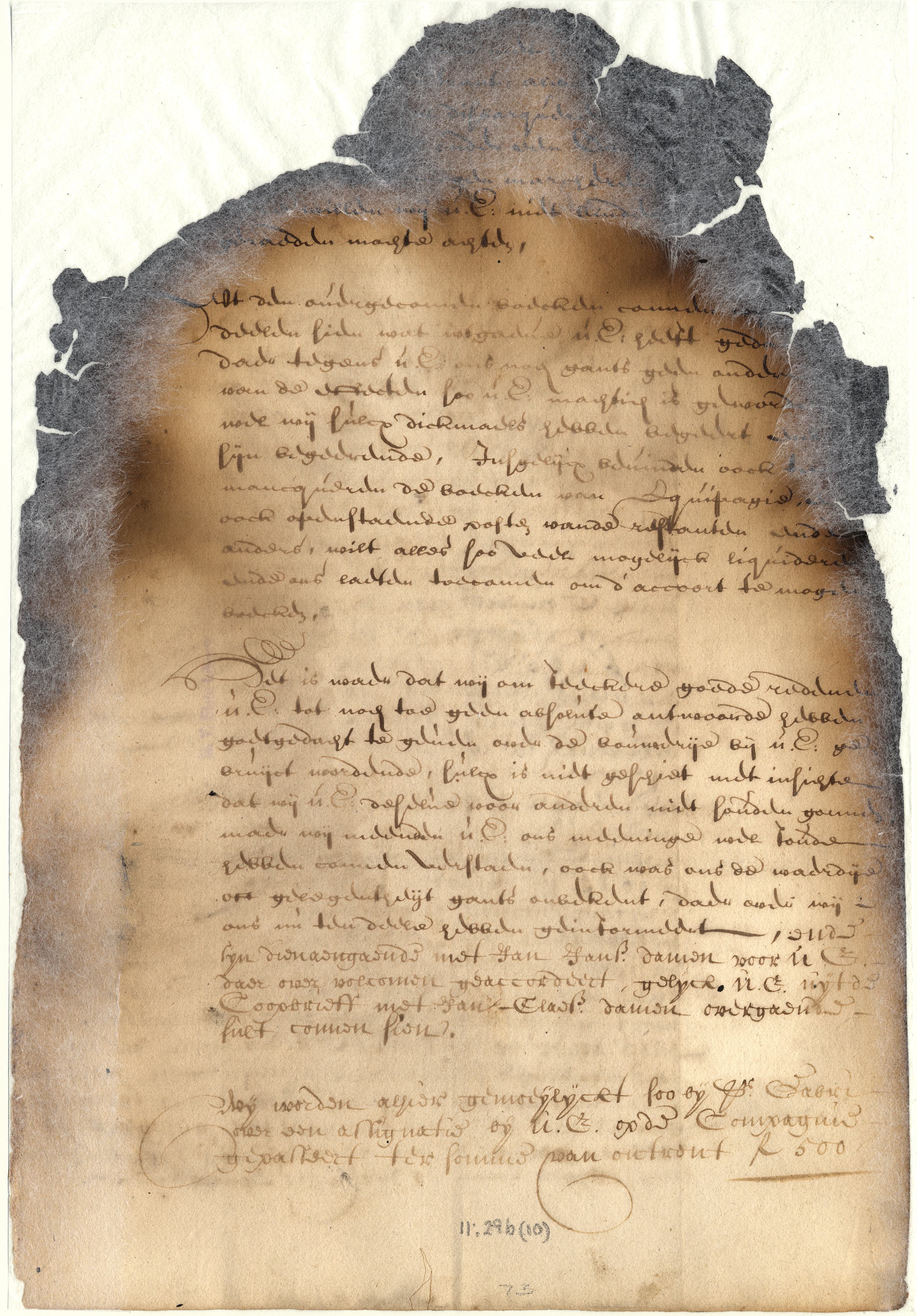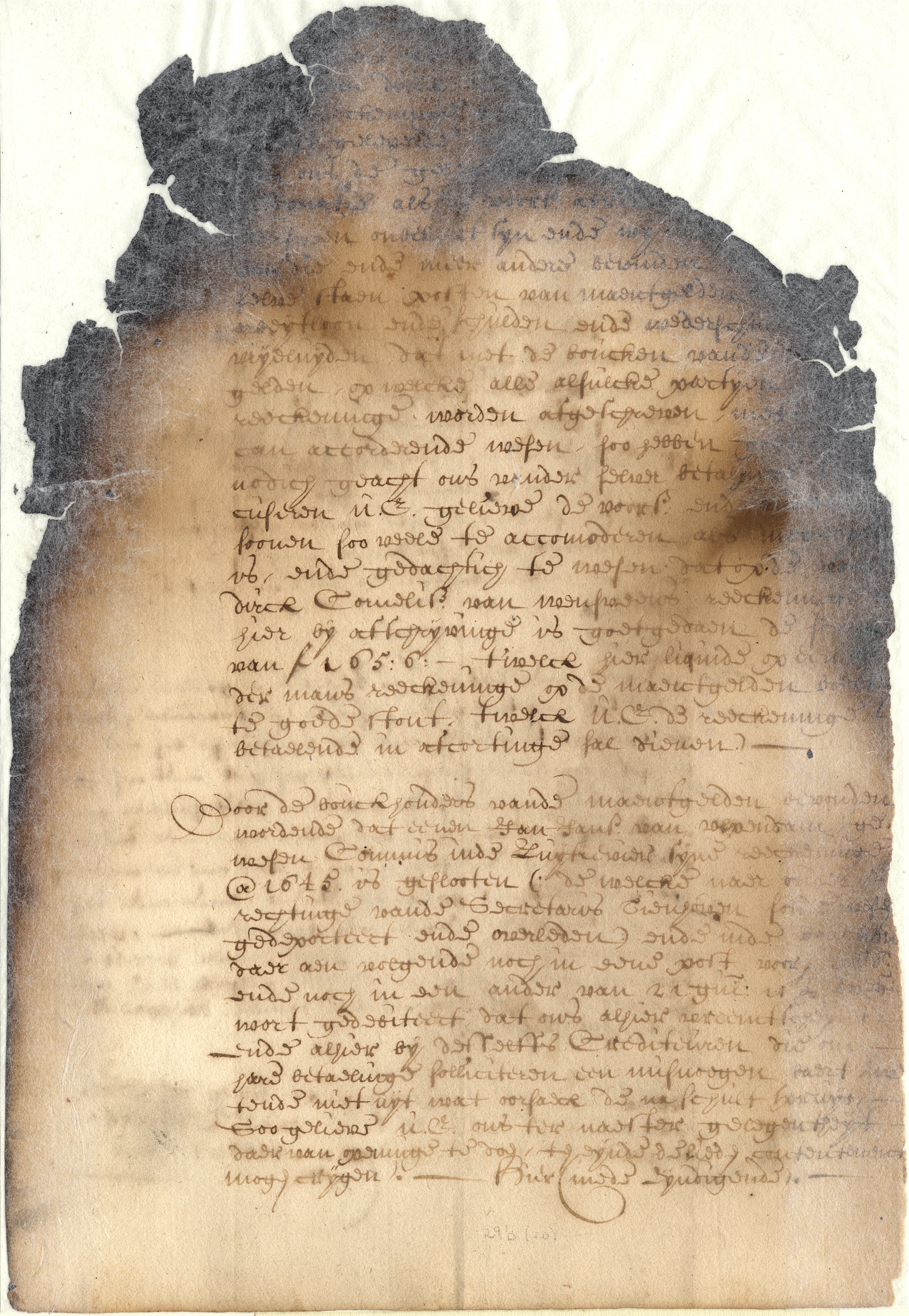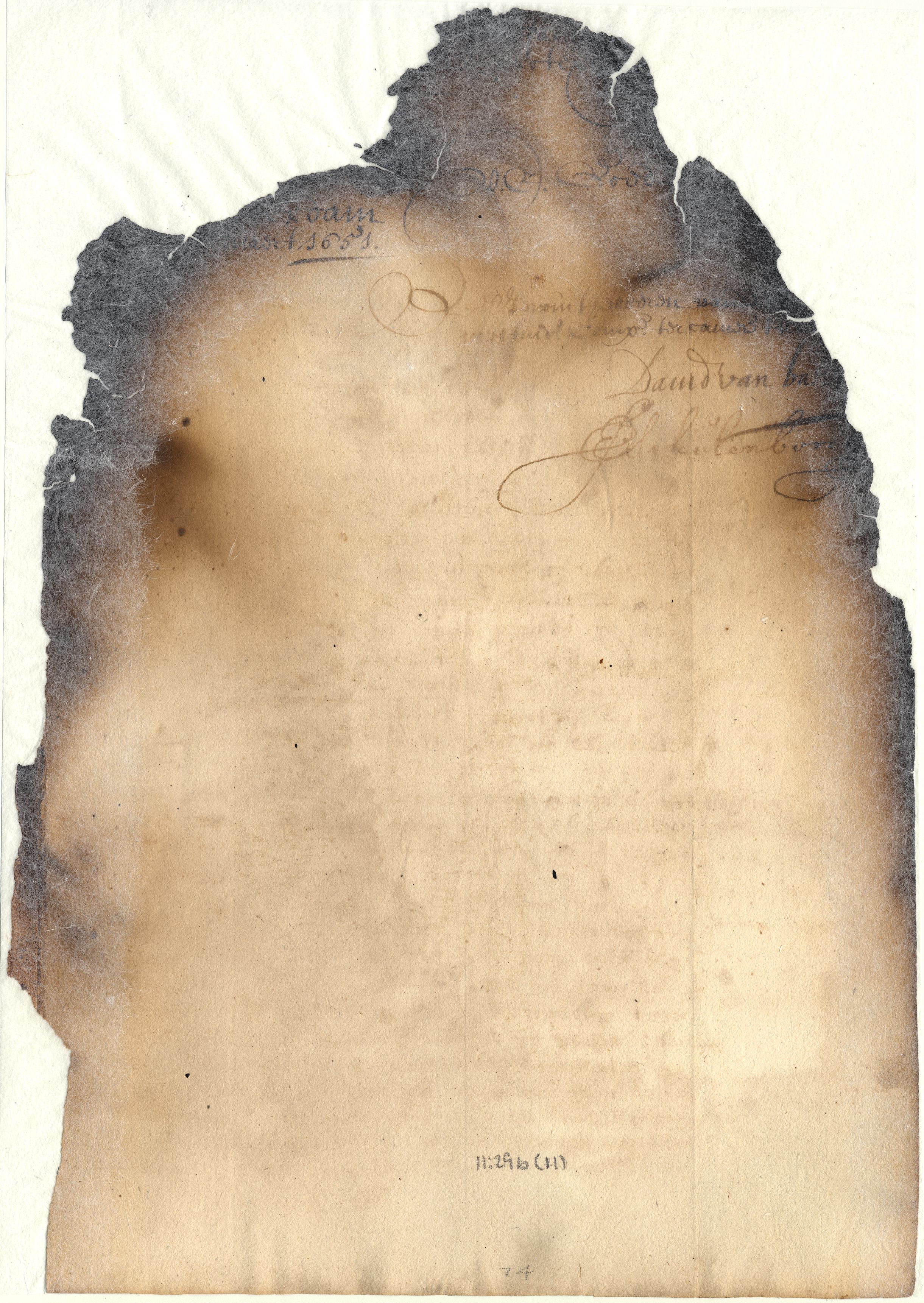[1]March 21, 1651
[Honorable, Worthy, Pious, Faithful.
Since our last letters of August 15th and July 24th we have duly received your favors of the 15th] and 24th of August, [ 7th, 9th and 12th of September of last year by the galliots St. ] Pieter and St. Michie[ and the [ships Valconier ] and den Graaf van Holland. The latter was long in coming and had been thought lost by many, but at last, thanks be to God, arrived safely. We find all your letters filled with complaints of various kind, some against persons, who should give no cause for complaint, as they are sworn servants of the Company. Your principal grievances are however against the returned delegates, who, we observe, not only trespass upon our leniency, but also try to abuse the good intentions of their High Mightinesses. We had hoped, that these men would follow the advice of their High Mightinesses to live peacefully and quietly, but we are informed, not only, we regret to say, by your letters, but also by other trustworthy people, lately arrived here, that these men try by all sorts of underhanded means to stir up the good community and subjects against the Company and its officers and to mislead them from their duties, hoping in this way, if possible, to deprive the aforesaid Company and its officers of their privileges, prerogatives and authority. By virtue of our office and considering the interest of the many widows and orphans concerned we cannot remain indifferent to it any longer and have been compelled to warn in the enclosed [ letters not only our community, but also that of our English neighbors, to be on their guard against these disturbers of the public peace and not to assist them in their evil proceedings. We intrust these letters to you only on the understanding, that you will always act with ] caution and moderation. If you should perceive, that the aforesaid men and all others are inclined to do their duty, then you must forget the past and consider it not happened; this will be in conformity with the good intentions of their High Mightinesses, who granted a safe-conduct only to prevent, that they should not be molested on account of the complaints made by them here; it has never been nor is it now our intention, that they should be molested, if we could only see that henceforth these men as in duty bound will behave peacefully and respectfully, as we expect, through God's grace, to hear that they are so doing. We consider it therefore necessary to tell you, that only with regret and compelled by weighty reasons, we have issued the proclamation to our good subjects in the form as enclosed.
We observe that also some officials sworn into the service of the Company, do not conduct themselves in many cases as their position and oath require. We desire to warn these herewith that, although we have overlooked their errors for some time, we are by no means ignorant of their acts [and behavior and that, unless they pay more attention to their honor or oath in the future, than they have done hitherto, we shall be compelled to take such measures in regard to them, as are usually employed against unfit or ungrateful servants. We have to say this, because matters have come under notice for which they can make no excuse and which we cannot tolerate.
The impudence of some people there, especially of Cornelis Melyn, more than astonishes us; they dare to misuse the name of their High Mightinesses so far as to pretend the Colony is to be divided into seven provinces, a royal fort built upon the point of Staten Island, where all vessels must come to anchor before sailing up to the Manhattans, and other similar falsehoods. We have never heard of these and other dreams, so that you need not trouble yourself about them nor take any notice of them, if you should hear of them from anybody else than ourselves.
We observe that many people do not scruple to take possession, under this pretext, of all the best land there without formality and without determination by survey, as if the Company and its officers had nothing to say about it and had been robbed or deprived of their prerogatives; we have therefore to direct you herewith, not to grant land to anyone without his acknowledging properly the authority of the W.I. Company and you will especially take care that henceforth not more land is granted to people, than what in your opinion after a thorough examination of their means they will be able and intend shortly to populate, cultivate and bring into a good state of tillage. Several instances prove, that by non-observance of these rules many parcels of land are now claimed as property held for years, although very few improvements in regard to settling, cultivating, tilling or planting have been made. Thus we see it in Cornelis Melyn's, Wouter van Twiller's and others' cases; Melyn owning an island, 7 or 8 leagues long, of which only eight morgens of land are under plough. Wouter van Twiller is not only not satisfied with adding Hellgate to Nooten Island, but he also tries to get possession and make himself master of the Catskil, in addition to which he has stretched out his hand for the two flats on Long Island, called Twyler' s and Coder's flats, containing together 1600 to 2000 morgens.
Wolfert Gerritsen and Andries Hudde have done the same: they took possession of about 18[ 00 ] morgens on the same island, while they cannot settle the fiftieth part of it: this is quite against our intentions, for many valuable pieces of land might be claimed as property (with great prerogatives) in such manner and the land itself would remain unpeopled. We direct you therefore expressly not to allow or grant any more land to anybody except under the conditions stated above and keeping Long Island (which we believe to be the most important and best piece) for the Company, to be divided upon occasion for the accommodation of farmers and planters, until a rule shall have been made as to how much land shall be allotted to each colonist.
We are astonished beyond measure to hear, that your deputy, Dincklaken, has made common cause with these invaders, especially with Govert Loockermans or others, who have bought much land from the Raritans on the Kil opposite Staten Island, without considering in whose name they are to obtain a conveyance from their High Mightinesses without the knowledge of the Company, we cannot believe it and intend to resist it with all proper means, as far as we are concerned.
A good deal more might be said about these matters, but we will defer it until a better opportunity or refer you to the verbal report of Secretary Thienhoven, who, we think, has been detained here long enough for his own inconvenience out of consideration for some evil-minded disturbers of the public peace. We have on our part judged it advisable to give him permission to return to New Netherland and he will inform you by word of mouth, what has been and is daily being done here in regard to New Netherland matters. No doubt you will derive from it so much satisfaction that you will no longer ask for his recall, for you will learn from all the circumstances that we make all possible endeavors to maintain not only the prerogatives of the Company, but also your administration and authority.
We have before now given orders that upon such occurrences, as you complain of, especially the creating of uproar on the streets or elsewhere by people, who ought to know better, full documentary evidence should be sent to us. We wish, it had been done in your last letters and do not believe for certain good reasons, that you had no reliable witnesses, the more so, as you say, that these proceedings are not approved by the majority of the community. Our belief in this is confirmed by the testimony of the English people living within our boundaries.
We are anxious to learn how you have been treated by our English neighbors in regard to the boundary question. It seems to be best to live with them in neighborly friendship and correspondence, as we have great hopes, that the envoys from this government, who will shortly leave for England, will settle the question satisfactorily with the English authorities, a matter which it is said, has been especially recommended to them.
It is further our intention to apply to the Queen of Sweden and try, whether we cannot determine the boundaries between us and the Swedes on the South river. You must in the meantime endeavor to maintain the rights of the Company in alljustice and equity, but we recommend at the same time to act at all occasions with such discretion and circumspection that complaints, disputes and breaches of friendship with our allies be avoided.
We can take no further notice of Brant van Slechtenhorst's[2] remonstrances, than to receive the information of the taking possession of the Katskil, which had been conveyed to others long before he took possession of it and we have so far not been able to discover, by what right he or his principals lay claim to this property, for they have never applied to the Company for it in due form. Nor can we understand, how the colonists of Rensselaerswijck could take possession of Beeren Island, afterwards called Rensselaers-steyn, and go so far as to invest this place with the right of staple demanding from every one,[3] except the Company, a toll of 5 per cent on his goods and growing so impudent, that they finally asserted, Fort Orange was built on their territory and they would not permit anybody to take his residence in the fort, even though the Company has given their consent, and engage in the fur trade.
We have only this to say to them in reply. That this fort had been built by the Company many years before the said colonists selected the territory for their colony; we have therefore already directed you to protect the rights of the inhabitants of our fort and confirm herewith our former orders, adding further, that you must resist by all proper means and if necessary by force the attempts of all daring to levy taxes or imposts in any river, island or port within the Company's jurisdiction to the injury of the public in general or individual traders. We are resolved never to grant to any colonist such privileges and jurisdiction, as these people erroneously imagine to possess.
It is astonishing that the aforesaid delegates dare to spread the report in the community that the Company owned no other soil in New Netherland than Manhattans Island, while it can be clearly proved that they have bought vast tracts of land on the South River, the Fresh River, Long Island and many other places in the neighborhood. These men are therefore grossly deceiving people and try only to dispossess, if possible, the Company; but we hope to thwart them.
It is true that the Notary Jan van de Venne[4] has made several applications for a large tract of land, which you think might be granted to him without much prejudice to our interests. We would have no objection to grant his request, if he would only desist from his extravagant demand of highest and lowest jurisdiction, which we deem inconvenient and are still determined to reserve for the Company. However, we are willing to give everybody as much land as he shall need. Many people are again going over in the ships now ready to sail, who intend to settle there and you must accommodate each according to his position and the number of souls with him, consulting your own discretion and the requirements of their families, for it is our aim to promote the increase of population there by all means. You will also accommodate the Honorable Hendrick van der Capelle[5] with favorably located lands, as far as he is inclined to take possession of and cultivate and people any land there, which he seems to intendjudging from his letters: we desire very much that such wealthy people might take a fancy for that country. We regret, that we cannot fully comply with the request of Mons. La Montangie, although we are willing, upon your recommendation, to grant as much as the condition of the Company admits. Under these circumstances we thought it advisable that you should be directed to encourage him in the continuance of his duties and not to molest him for the present on account of what he owes to the Company, further also to increase his yearly salary from 150 to 200 and to favor him, subject to our approval, with any office, becoming vacant, for which you think him fit.
We cannot say anything about the copies called for by Domine Megapolensis, except that we delivered to the revered Classis the manuscript of his "Examination or Confession for the benefit of those, who are inclined to approach the Lord's Table," that it may be printed: although we have called upon the reverend brethren several times, we have as yet received no other reply, as that they would take this matter into serious consideration. Meanwhile the Almighty has been pleased to remove Do. Kesselerus, a member of the commission, from this vale of misery; this is likely to retard the matter somewhat, but we shall not cease to push it. This department has resolved to release you from your private engagement with Do. Megapolensis and to charge itself with his yearly salary, hoping that with the Lord's blessing these lands will shortly be in so flourishing a condition, that all the expenses for them may be paid out of their revenues and that in time also a part of the moneys disbursed by us may be refunded. With this view we recommend you seriously to make all possible efforts in collecting old debts due to the Company and the tithes from such pieces of land, which are now subject to them; so that we may be relieved from the municipal expenses.
We think a distinction should be made between the bouweries owned on the land of the Company and improved before occupation by the present owners and those taken up in the wilderness. We leave that to your discretion, for not possessing the proper information we cannot well make an equitable discrimination. Some merchants believe that the duties on beavers are too high, the merchantable beaver being rated there at ƒ 8; they have therefore asked for a reduction to ƒ 6, to which we cannot
consent, as most of the beavers, arrived in the last ships, have sold for ƒ 10a piece or thereabouts. We find besides that large quantities are being smuggled in. The same is done with goods for your market and we have come to the conclusion, that the Fiscal either connives with the defrauders or is not careful enough: we are led to use the former expression, because we learn from common reports, that he is altogether too intimate with the traders, especially in places, which our servants and principal officers should not frequent. If any complaint should be made on account of what we just have said, we are prepared to give a plain answer, on which you may rely, and if the Secretary and the Notary find no other chances to certify to complaints, then there can be no difficulty.
It is not all strange, that passengers arriving there complain of too high passage rates, but we cannot help it at this time, although we have made efforts, even threatened the skippers not to allow them a commission, unless they would take passengers at seven stivers per day for board. It was all in vain and we have been obliged to make an agreement with skipper Bloemart for the transport of the soldiers and train personal, coming herewith, at 8 stivers per day. We shall speak of these men again further on.
We are surprised, that you amuse yourself with protests and counter protests against the municipal officers concerning matters of so little importance as for instance the pews and seats in the church and as we trust that the church is large enough to place every one according to his rank, it appears to us, that such trifles do not deserve so much attention especially in these troublesome times.
We were sorry to hear, that the Maquas had invaded the territory of the French in Canada and captured 8 or 9 Christians, for whom they are said to demand a large ransom or they would cruelly torture them, which excited your compassion. That is quite proper for all Christians, but every one is bound to take care of himself and his own people. You know, that some time ago men of this nation were ransomed at the expense of the Company and by contributions of the community, for which we have never been repaid. We think now, that when the complaints reach France, they will take care of their own countrymen.
So far it has been beyond our means to comply with your request to send you a large amount of money in small coin for the benefit of the public and it is equally impracticable to compel the traders, agreeably to your second proposition, to pay the duty of 8 percent in cash and thus bring small coin to New Netherland; they make now every effort to free themselves from all burdens, at least from the greater part of the customs and Wouter van Twiller[6] with his set encourage them not a little, trying to persuade them that modifications will be made, because everybody is unwilling to employ his ships in this trade or to bring his goods into our warehouses. We do not know upon what grounds these assertions are made and doubt not, these people will soon find out, how they have been deceived, especially when Van Twiller attempts to carry out his intention of making himself master of the whole North River trade. We know that he has laid his plans for this for some time past, seeing that he introduced the right of staple on Beeren Island, now by them called Rensselaersteyn as mentioned above; but we do not at all intend to tolerate that. Everybody shall have free and unmolested navigation on this river and trade at our Fort Orange, claimed by them to be erected on their territory. Who ever heard a more impudent assertion! This matter makes us averse to grant to anyone in the future such unlimited colony and jurisdiction, although we are at all times willing to allot to every applicant as much land as they will populate and cultivate, as we have already said. Although we have once before written about the Island of Curaçao that, if we should have no revenues whatever from there, it might be advisable to abandon it, instead of holding it any longer in hope of unexpected returns; we did not mean to say, that we had come to that resolution, but used it only as an example. The enclosed contract, made with a Jew, Jan de Ulan, will prove to you the contrary. He intends to bring a considerable number of people there, to settle and cultivate, as he claims, the land, but we begin to suspect that he and his associates have quite another project in view, namely to trade from there to the West Indies and the Main. Be that as it may, we are willing to make the experiment and you must therefore charge Director Rodenborch to accommodate . him within proper limits and in conformity with the conditions of his contract. You propose to go to the Island and make the experiment yourself, believing that you can make the round trip in four or five months and you desire us to direct, who shall meanwhile take your place: our answer is that we consider such an expedition quite unadvisable in these tumultuous times, for many free people are going over with every ship, who will require your assistance in every respect.
We are, in the meantime, anxiously expecting the ship de Hoop with a good freight of dyewood, the more so as we are informed by good authority, that a large quantity of this article was ready for shipment on the Island: we do not understand however, for what reason it has been kept there so long. Had such a cargo arrived here in time or had we at least been sure of its coming, then we could have complied with your request to freight a large ship, which in such uncertainty we could not dare to undertake: now it tends to our prejudice and to the inconvenience of the people there for whom we could have provided better. We have also found, that you have had some wood brought to New Netherland, which was sold there and the same has been done with the cochenille silvester, captured by Captain Blauvelt: all this is directly contrary to our orders. We gave our reasons before and that should have been sufficient, to prevent you from placing us in danger of unnecessary lawsuits. It is true that as yet no inquiry has been made about it, apparently because the people do not know what has become of their property, but time will tell, what the consequences may be.
Although you are of opinion that the ships Lie/de , St. Benino and Jonge Prince were lawfully and properly confiscated, we are nevertheless called to account about it and some of the lawsuits are apparently going against us. We see in the documentary evidence sent us, that the Fiscal did not formulate his complaint correctly and did not accompany it with sufficient proofs. He must be more careful in the future; he also ought to have investigated, what had become of the embezzled pieces of camlet,[7] sold at such scandalous prices. We urge you to do it, but we intended also, that you should admonish the Fiscal to do his duty.
You persist in asking for equipment and accoutrements, promising upon their receipt to send us in the spring by the ship Prins Willem a cargo of dyewood. We have done as much in this regard, as we could, and are now expecting the ship. In the hope of the early arrival we exert ourselves again to send you by its next voyage soldiers, train-personnel, ammunition and other necessaries according to the enclosed list, intending that, as you promised, their pay should be defrayed out of the customs revenues.
All this must satisfy you, how deeply we are interested in New Netherland and your own reputation; we postpone much, that is important, in order to benefit that country, and expect from you a corresponding interest and care. We hope to receive by the next ship a specimen of the indigo, which you expected to obtain from a man on Sander Leenarts' ship.[8] Time must show the result. The plan, made last year, to send thither 300 to 400 boys and girls from some orphanages, will not be carried out, being found to offer too many inconveniences. No more correspondence is therefore required on this subject.
Jelmer Tomassen, late Captain of the yacht Nieuw Swoll has presented to us for payment your bond for _f 1000, dated 20th of August 1649, given for purchased cordage under promise, that it should be paid out of the first lot of dyewood sent over here. We had never heard of it and have therefore been obliged to refer the man back to you, as we have no doubt, that you will find means to satisfy him either out of the customs revenues or otherwise. We should have been able to pay off some smaller creditors by balancing their claims against the duties on goods shipped by the vessels now about to sail, but for reasons mentioned before this mode did not only appear dangerous to us, but was also impracticable this time on account of the great expenses caused by the soldiers, the ammunition, etc., which had all to be paid in cash. Moreover we have been compelled to allow skipper Blommaert, that he may deduct from the duties, payable by him, the cost of subsistence of 40 men for 90 days to be calculated according to the contract made with him. The aforesaid soldiers while making the passage are to be under the command of Captain Fijn, who goes over with wife and children to settle there. The Company owes him a balance of pay f 200, for which he has troubled u.s a good deal; if it had been feasible, we would have paid him, but now, as he takes with him a small cargo, we have allowed him to offset the above amount against the duties payable on his return cargo there. This transaction must be kept a secret, that we may not be troubled too much by others. The Captain is to receive, for taking the command of the soldiers, free subsistence during the passage for himself and must deliver them immediately upon arrival there to whomever you may detail.
We think it might be proper, when this ship comes into the harbor, to bring the garrison then present down to the strand, where the newly arrived soldiers are to land and then march them as one command in good order back to the fort. You need not feel bound by this suggestion, if you think some other way more advisable.
The books sent over tell us partly how much you have expended, but they give us no information whatever of the amounts and values, which you have received, although we have frequently called for it and are still demanding it. We find also that the accounts of equipment are missing, that many accounts are not settled, and other things. You will liquidate every item as far as possible and send over your accounts, so that we may make our balance.
For certain reasons, it is true, we have as yet not deemed it expedient to give you a definite answer in regard to the bouwery, which you are using. This has not been done, because we grudge you the place preferring others, but because we thought you understood our intentions, also because we were ignorant of the value and location of it, in regard to which we have now received some information. We have now fully agreed on this subject with Jan Jansz Darnen, acting in your behalf, as you will see by the contract of sale sent over with Jan Claesz Darnen. Peter Gabri annoys us here with a draft, drawn by you on the Company for about ƒ 500, which he wants paid; Govert Lockermans too, as husband of the widow of Dirck Cornelissen van Wensveen, importunes us for an account of ƒ 861.9.8, originating out of goods delivered, work done and other sources. As we are however quite ignorant of the transactions, the draft as well as the account of Wensveen, and as we have observed that in his account and others items of monthly wages, pay due to laborers, debts and credits of free people are entered, which do not agree with the book of monthly wages, in which all such accounts are recorded, we have judged it best to decline paying it and you must arrange matters with these and other persons, as well as you can, remembering that the account of Dirck Cornelissen van Wensveen has been credited with the amount of ƒ l65, 6 st., an item found open in the book of monthly wages to the credit of another man. In paying this account you will deduct this sum from it.
The bookkeepers of monthly wages have discovered that one Jan Jansen van Ilpendam, formerly Commissary at the South River,[9] closed his accounts in 1645 (Secretary Tienhoven informs us, that he was deposed and is dead now) while in the books of following years he is charged in one item with ƒ 288 and in another with .ƒ 21, 25 st. These entries appear rather strange and create dissatisfaction among his creditors here, who ask for a settlement, while we do not know, whence these debts arise. You will please give us an explanation by first chance (at the first opportunity), so that these people here may be given satisfaction.
Closing herewith, we commend you etc. etc.Amsterdam, 21st March 1651
W.I. Comp
David van Barten
J.P. Schulenborch
Rights: This translation is provided for education and research purposes, courtesy of the New York State Library Manuscripts and Special Collections, Mutual Cultural Heritage Project. Rights may be reserved. Responsibility for securing permissions to distribute, publish, reproduce or other use rest with the user. For additional information see our Copyright and Use Statement Source:New York State Archives. New York (Colony). Council. Dutch colonial administrative correspondence, 1646-1664. Series A1810-78. Volume 11, document 29b, page 1, side 1.
